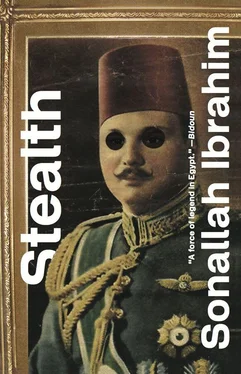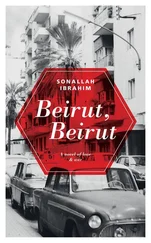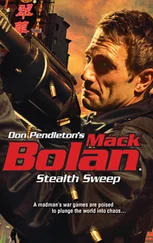“Where’d you get it?”
“From Shimla for 58 piastres.”
A plump, dark man comes up to us. His fez is in his hand. His hair is thick and black. He has a huge head with a big wide face. Hajj Abdel ’Alim and Refaat Effendi stand up: “Please join us, Mandour Bey.” Father kicks me, so I’ll get out of my chair for him. Abdel ’Alim says: “Dr. Mandour is from my same village of Minya al Qumh. He was involved in the 1919 revolution.” Dr. Mandour is shy as he speaks: “Really, I was just a child then. I’d come back from school on a donkey. From on top of the Mathoubus Bridge, I saw a demonstration of effendis and fellahs together, chanting for independence and for Saad Zaghloul. The English soldiers came out of the police station and started to fire at them. That day, more than 100 were shot and many of them died. I went back to the village with the news. People gathered and grabbed their axes to go break up the government’s railroad tracks, but Othman Abaza, who was a pasha and the biggest landowner in the area, caught up with them and calmed them down.”
Refaat says: “Just the same, we’ll consider you one of the heroes of the revolution and vote for you to represent our precinct.” Dr. Mandour laughs: “That is if we even have the elections.” Abdel ’Alim says to the priest: “What about you, your holiness? Who are you voting for?” The priest says: “God’s truth be told, I committed to vote for Girgis Salih, the candidate of the Saadist Party.” Father says: “Me too.” Dr. Aziz says: “This country needs an election sweep that’ll bring in a new government.” Refaat says: “That’s not possible as long as we have emergency law.” Father says: “We need the emergency laws because of all these political assassinations and the war. If they let them expire and had elections, the Wafd party would come to power.”
Dr. Mandour challenges him: “So what’s wrong with that?”
“We’d go back to bribes and abuse of power.”
Dr. Mandour tries to control himself: “So, you, sir, believe that right now there’s no bribing and abuse of power going on?”
Abdel ’Alim says: “The doctor is right. We saw what the papers wrote about the Minya airport and the relationship between the politicians and the land owners.”
Dr. Mandour keeps going: “Besides, the Wafd isn’t just Othman Muharram and Fouad Serag el-Din. There are other members who are good, patriotic people. The important point is that this state we’re in now won’t do. Prices are going up every day. School fees are rising. The king goes to the automobile club every night and gambles. The other officials go to the tiro gallery to place their bets.”
The turbaned sheikh asks: “What is this tiro thing?”
“It’s betting on shooting matches at the Rifle Club.”
A breeze stirs up a pile of dirt at the end of the street and it comes down on us. Abdel ’Alim says that repair workers have been digging up the streets and leaving their dirt on the sides to be stirred up by wind and traffic. Then they start to level off the street with gravel, but without paying attention to how high they go, so that the street level comes up higher than the street that meets it, so they have to start the repairs all over again to make the street level with the rest of the neighborhood, and so on and so forth. Dr. Mandour says: “It is all to the benefit of the sub-contractors. They’ve become millionaires with guard dogs and servants collecting salaries that university graduates can only dream of.”
Refaat says: “It’s gotten to where we can’t even get on the bus because it’s so damn packed.” Dr. Aziz says that the companies being taken over by the government are losing lots of money. “Nationalization does no good.” Dr. Mandour starts to get worked up: “That’s what Aboud Pasha is telling people. The companies themselves are causing overcrowding. They’re making the drivers and the ticket collectors let on more and more passengers. They want to grab as much money as they can before they get nationalized, and then leave nothing but pieces of scrap metal that they call buses.”
I see a magazine on Abdel ’Alim’s desk. I sneak inside the shop and pick it up. It is folded open to a page with an ad for the film Passion and Vengeance, starring Ismahan and Yusuf Wahbi. I pick up the magazine and take it outside. I show it to father: “Ismahan has a new film out.” He says: “That’s an old one. She made it before she died.”
“When did she die?”
“Four years ago. Isn’t that right, Refaat Effendi?”
Refaat crosses his legs. His black shoes are shiny in the faint light: “Yeah, that’s right. Four years.”
Abdel ’Alim throws in: “Still nobody knows whether she died by God’s hand or somebody killed her.”
Dr. Aziz says: “Of course, she was killed. Her car crashed into the water without a driver. Where did he go?”
The turbaned sheikh asks: “So who killed her?”
Father says: “The British Secret Service. She was a spy for the Germans.” She lets father out for ten minutes to go to the bathroom. She goes with him all the way to the door and waits there until he comes back out. She leads him back to the room as she watches him carefully. He tries to touch her but she says: “Don’t try it. You’re a German spy and you have to go to jail. Or would you rather I tell the police and make a big scene?” I sneak inside the room with him. She locks us into the room. My father makes a joke of it. He says: “It is written for me to go to prison and this one sure is better than the government jail.” To the right, there is a stack of living room chairs piled on top of each other. Their bed with its brass posts stands to our left. He tells me to take the pan out and fill it up and see what happens. I knock at the door for her to open. I fill the pan, spying on her at the same time. I rush back to the room to tell him.
Dr. Mandour says: “Queen Nazli is the one who planned the whole murder. She was jealous of her.”
I become interested now that they’re talking about the king’s mother. Father asks: “Why?”
“Because of Ahmad Hassanein Pasha.”
“What about him?”
“She was his mistress.”
“Who? Ismahan?”
“Ismahan at first, then the queen.”
He talks about the crisis in cinema and theatre. He says the producers made huge profits during World War II by making comedies and fluff. Then the actors started getting salaries that nobody had dreamed of. This attracted everyone and their mother into the business of film production until the standard of films started to sink, and they went all the way down to appealing to the basest instincts of the lowest common denominator. I lean over to father and whisper in his ear: “I want to see Ismahan’s film.” He says to me sharply: “Inshallah.”
He drags the desk chair to the balcony. The alley is dark. A faint light shows in some of the windows and balconies. He grumbles about the heat. Takes off his skull cap. He tries to fan his face with it. I stand next to him. We notice Siham leaning on her elbows in the frame of their window. The engineering student is next to her. Fatima comes to us with a stalk of sugar cane in her hand. She sees where we are looking and says that Siham became pregnant by the student and that is why they rushed into a quickie marriage. Father growls at her: “What do you care?”
She is barefoot as she sits down cross-legged on the clean bare floor tiles. She peels the stick of cane and carves off a piece with her knife and offers it to father. He laughs and says he cannot chew it. She gives it to me instead. I bite it and start to chew and keep on until it is just pulp that I spit out and throw on to the plate. She stretches her legs out in front of her. She throws the second piece to the side, saying that it’s too stringy.
Читать дальше












